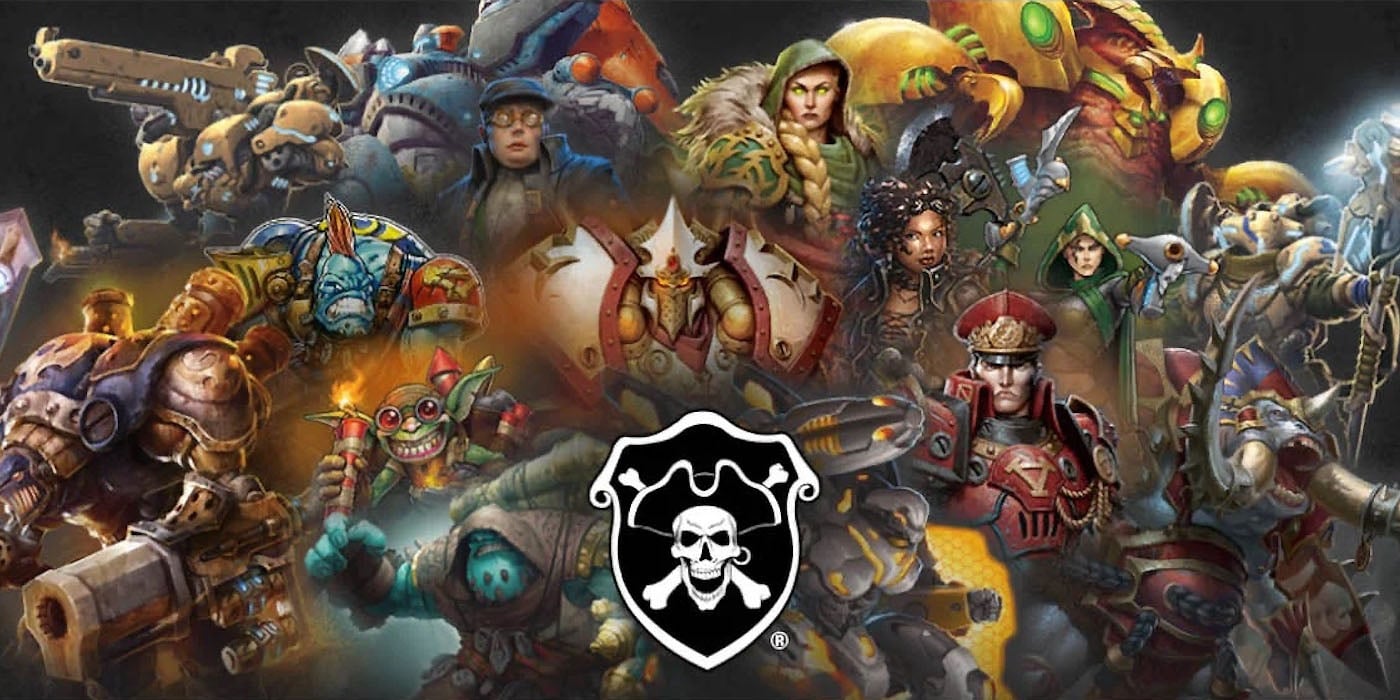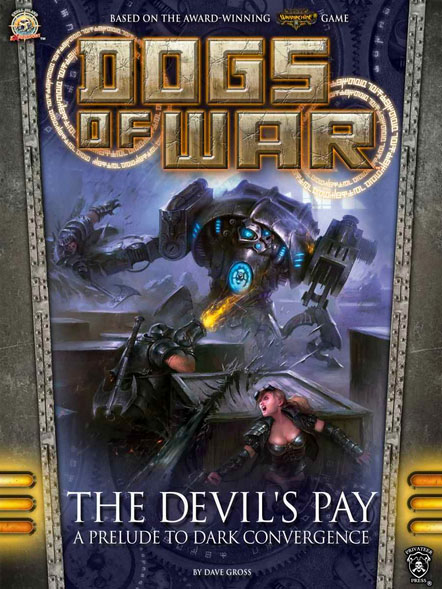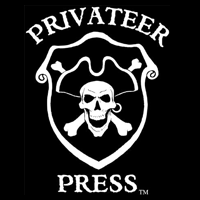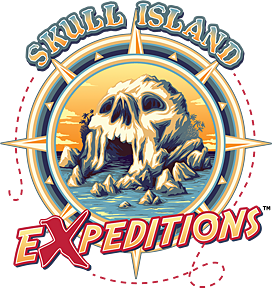INTERVIEW: Privateer Press Author Dave Gross

Privateer Press author Dave Gross talks shop about his first upcoming novel: The Devils Pay.
1) Dave, can you tell us what excites you most about writing for Skull Island eXpeditions and the Iron Kingdoms?
The Iron Kingdoms setting is simultaneously very familiar and quite distinctive.
When you first look at WARMACHINE, HORDES, or the Iron Kingdoms RPG, you see all of the instantly recognizable archetypes—warriors, wizards, priests, and rogues, as well as dwarves, goblins, elves, and dragons—yet they’re all just a trifle different. The warriors fight with electrified blades, and the wizards command huge “golems” known as warjacks. The rogues carry spanners. The dwarves and elves clearly never heard of Tolkien, and the dragons are downright Lovecraftian. Everything’s just a little twisted from the familiar ideal. I love that.
Also, while you can use “steampunk” as shorthand for the mechanikal elements of the setting, and that gives a potential fan a decent barometer on what to expect, it’s not quite the same. It’s a combination of magic and weird science, the veritable chocolate and peanut butter that combine to make their own thing.
So what I find most exciting is that everything looks familiar at first glance, but the moment you scratch the surface you find the world has a unique character. It feels comfortable and strange at the same time.
2) You’ve written for Paizo’s Pathfinder and D&D in the past. As a writer and a reader, what, to you, is the defining characteristic of the Iron Kingdoms?
I think everything revolves around the heroes, not just in terms of writing the stories but in how the various factions of the world interact. People in Immoren know the names of their enemy’s heroes, and they fear the Butcher even more than the deadly Winter Guard. It isn’t the Cygnaran Army that saves the people; it’s Victoria Haley or Stryker.
Even though they aren’t called out as such, the warcasters and warlocks of the world are like the demigods of Greek mythology. In the Iron Kingdoms, you’re not just raiding a dungeon for gold and treasure. Each time you write or read about these heroes or play them on the tabletop, you’re leaving a mark—or a wound—on the history of the world.
3) You are working on two books currently. The first is “The Devil’s Pay,” a novella. What can you tell us about that? No spoilers, please!
Actually, I just finished the manuscript for the novel, Dark Convergence. The novella, “The Devil’s Pay,” was released along with Larry Correia’s “Instruments of War” and C.L. Werner’s “Moving Targets” just yesterday. The initial response has been very gratifying.
“The Devil’s Pay” features the Devil Dogs mercenary company. While Sam MacHorne is their leader, the novella follows Dawson, a new recruit, as he learns now to navigate the big personalities of the company’s veterans on his first mission. Unfortunately for him, it’s a highly dangerous mission that takes the company into the Wythmoor in search of a strange warjack for a special client. They end up running into far more than they expected, including a particularly badass group of Steelheads, Cryx (of course), and something that no one has ever seen before.
It’s not a huge spoiler to say that here’s where most people will have their first glimpse of Convergence of Cyriss forces.
4) How do you feel about diving into uncharted waters as the first Iron Kingdoms novelist? What’s it like to dive into such a rich existing world with so much detail and so many characters already put to paper (albeit in a non-novel format)?
It’s overwhelming and terrifying. Seriously, I’m permanently scarred, and that’s just from the 800+ page document of sourcebook fiction they sent me in the beginning.
It’s amazing how much setting material Privateer has produced in the past ten years. Trying to comprehend it all in a short time would cost 1d100 SAN. Fortunately, while I skimmed a lot of it, I was able to zero-in pretty quickly on the information most important to my stories.
The background on the Devil Dogs is relatively scant, but it does come from several different sources. On the other hand, it’s incredibly evocative, especially the history of how the company was founded, changed, and finally passed down through the generations until Sam MacHorne got hold of it.
What really made it work for me were the illustrations and the miniatures. One look at those figures and I almost immediately knew their personalities. Lieutenant Lister, Sergeant Crawley, Smooth, Burns, and Harrow pretty much leaped from the screen, through my eyes, and into my brain fully developed. The others required a little more thought, but with such a solid foundation of characters, the rest evolved easily.
In a way, the Devil Dogs were the perfect entry point to the Iron Kingdoms, since they have some history but not too much. That way I have a hook to start with, but there’s plenty of room to flesh out each character. It’s much, much more daunting to tackle a more famous character with a longer and more strictly defined history. And maybe a famous mustache.
5) Can you give us an idea how the interaction goes on between you as a novelist and the Privateer Press design staff?
First of all, the person who makes this all work is Scott Taylor, their Director of Publications. He solicits the writers, communicates with the developers, and basically plays traffic cop for the whole operation. When this thing is a success, people need to point at Scott and say, “He’s the guy who made this work.”
That said, a huge amount of direction comes from the Privateer developers. Through Scott, they were the ones who told me, “We want you to write about the Devil Dogs on a mission that leads them to the revelation of this secret.” I knew there’d be a lot more detail to come from them later, as they finalized the new faction.
At that point, Scott and I batted around some ideas on the phone. I sent over an outline. They shot it in the face. I sent over a bigger one. A small army descended upon it, cut off the weaker limbs and suggested some replacement parts. This happened a few times in multiple waves, more than I’m used to—but the end result was a story that fit the setting and tone of the Iron Kingdoms.
While Jason Soles and Doug Seacat (and perhaps others who didn’t sign their notes) offered critical feedback on making the story fit the world, the guy who most helped me make the plot and characters better was Matt Wilson. People might think of him primarily as a visual artist, but he’s also got a keen eye for story structure, and I sense he’s a fellow film nerd. He offered some of the best suggestions for making the story and characters more heroic while allowing them to remain flawed and idiosyncratic, which is what I’m most drawn toward.
In the end I thought of Jason and Doug as the teachers of arcane knowledge, Matt as the coach who makes you do your best, and Scott as the principal who keeps all the information flowing where it needs to go.
6) I think folks may be most interested in your upcoming full-length novel Dark Convergence. What would like to say about that one? It certainly has an eye-raising title . . .
Dark Convergence features Sebastian Nemo facing Cygnar’s first serious military contact with Convergence forces. They’re led by Aurora, who earned the title Numen of Aerogenesis because she invented the device that allows her bodyguard—deadly clockwork angels—to fly. It starts off with an ambush, and it includes factional infighting, diplomacy, intrigue, betrayal, and finally a full-on battle that ends up with some of the wrong people dead on the ground.
7) It’s been said that are very few true “bad guys” and “good guys” in the Iron Kingdoms (except those pesky dragons and their servants). Do you think this limits or opens up opportunities for authors writing in this universe?
I much prefer painting in shades of gray to black and white. Still, I think there are truly good guys and bad guys in western Immoren, even allowing for differing points of view. You’d be hard pressed to find a hero among the Cryxians, for example—even when you see it from their point of view, it’s hard to feel great sympathy for the murderous undead.
I wrote Dark Convergence from the points of view of both Sebastian Nemo and Aurora. While writing, I always felt sympathy for each of them, but at other times I tried to see each through the point of view of the other. Even if you think he’s a hero, someone who flings lightning and controls Thunderheads resembles an angry god more than a valorous knight. Also, sometimes he’s a real dick. I have a feeling that by the end of the story, some readers will have changed their minds about whether certain of the characters are good or evil. Or dicks.
8) So let’s talk about characters. Who’s your favorite warcaster hero(ine) and why?
My confession is this: I don’t know nearly enough of them to have a favorite. Let me tell you a different story related to a warcaster.
Months ago, when Scott first approached me about this project, he flattered me by saying he had a special project for me, one for which I was uniquely qualified.
Of course that puffed me up, and I said, like Benedick in Much Ado, “Now, tell me—which of my bad qualities did you fall in love with first?”
Scott said, “Well, you’re more mature than the other writers.”
“I’m mature how? Like a clown?”
“You’re old, right? Like Sebastian Nemo.”
Well, he put it more politely than that, but I got the message: old guy writes the old guy. My hair isn’t even very gray! Fortunately, I like lightning and Caitlin Finch.
9) And on the dastardly villain side of things?
While I don’t really think of her as a villain, I’m also fond of Aurora for an antagonist. I want to know more—whether I write it or someone else does—about her “Uncle” Axis, the Harmonic Enforcer. He seems like the kind of fellow who’d be a lot of fun on a pub crawl, although he’d likely leave a trail of bodies in his wake.
While I don’t know most of the individual warcasters and warlocks to give a better answer, I am learning more about WARMACHINE and HORDES each week. So far, I have only a few Cryx and Cygnar models, but I’m starting to think I’m going to collect Circle and Convergence armies. No doubt I’ll develop favorites from those factions.
10) Finally, as a parting shot, what’s the number one reason newcomers should give SkullIsland eXpeditions a fair shake?
To my mind, the great thing about Skull Island right out of the gate is you have three novellas by three different authors. Not only that, but one focuses on a warlock, another on a pair of mercenary heroes, and the third on a whole company. I don’t know their work well, but at a glance I can tell you that Larry, Clint, and I write in very different voices. So there’s diversity from the start, the veritable “something for everyone.”
Now I’m going to cheat and tell you the number two reason: Scott and the Privateer devs are pouring a huge amount of their attention to ensuring these stories belong in the world of the Iron Kingdoms. I think players of the game will appreciate the authenticity that results from their work, even as we’ve striven to write stories that will also appeal to people who’ve never heard of the setting before.
Thanks so much to Mr. Gross for taking the time to talk to the BoLS Readership. We’ll see you in the Iron Kingdoms.








